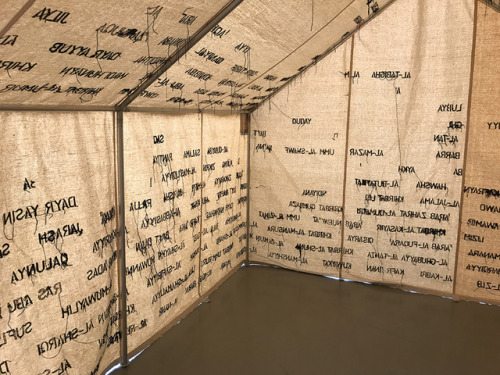Day Of Solidarity With The People Of Laos (October 12)

Day of Solidarity with the People of Laos (October 12)
OSPAAAL poster, Cuba, 1969
Via Soviet Visuals
More Posts from Thxsdad and Others


Emily Jacir
‘MEMORIAL TO 418 PALESTINIAN VILLAGES WHICH WERE DESTROYED, DEPOPULATED AND OCCUPIED BY ISRAEL IN 1948′
A refugee tent embroidered with the names of the 418 Palestinian villages.
From Anthony Bourdain:
Americans love Mexican food. We consume nachos, tacos, burritos, tortas, enchiladas, tamales and anything resembling Mexican in enormous quantities. We love Mexican beverages, happily knocking back huge amounts of tequila, mezcal, and Mexican beer every year. We love Mexican people—we sure employ a lot of them.
Despite our ridiculously hypocritical attitudes towards immigration, we demand that Mexicans cook a large percentage of the food we eat, grow the ingredients we need to make that food, clean our houses, mow our lawns, wash our dishes, and look after our children.
As any chef will tell you, our entire service economy—the restaurant business as we know it—in most American cities, would collapse overnight without Mexican workers. Some, of course, like to claim that Mexicans are “stealing American jobs.”
But in two decades as a chef and employer, I never had ONE American kid walk in my door and apply for a dishwashing job, a porter’s position—or even a job as a prep cook. Mexicans do much of the work in this country that Americans, probably, simply won’t do.
We love Mexican drugs. Maybe not you personally, but “we”, as a nation, certainly consume titanic amounts of them—and go to extraordinary lengths and expense to acquire them. We love Mexican music, Mexican beaches, Mexican architecture, interior design, Mexican films.
So, why don’t we love Mexico?
We throw up our hands and shrug at what happens and what is happening just across the border. Maybe we are embarrassed. Mexico, after all, has always been there for us, to service our darkest needs and desires.
Whether it’s dress up like fools and get passed-out drunk and sunburned on spring break in Cancun, throw pesos at strippers in Tijuana, or get toasted on Mexican drugs, we are seldom on our best behavior in Mexico. They have seen many of us at our worst. They know our darkest desires.
In the service of our appetites, we spend billions and billions of dollars each year on Mexican drugs—while at the same time spending billions and billions more trying to prevent those drugs from reaching us.
The effect on our society is everywhere to be seen. Whether it’s kids nodding off and overdosing in small town Vermont, gang violence in L.A., burned out neighborhoods in Detroit—it’s there to see.
What we don’t see, however, haven’t really noticed, and don’t seem to much care about, is the 80,000 dead in Mexico, just in the past few years—mostly innocent victims. Eighty thousand families who’ve been touched directly by the so-called “War On Drugs”.
Mexico. Our brother from another mother. A country, with whom, like it or not, we are inexorably, deeply involved, in a close but often uncomfortable embrace.
Look at it. It’s beautiful. It has some of the most ravishingly beautiful beaches on earth. Mountains, desert, jungle. Beautiful colonial architecture, a tragic, elegant, violent, ludicrous, heroic, lamentable, heartbreaking history. Mexican wine country rivals Tuscany for gorgeousness.
It's archeological sites—the remnants of great empires, unrivaled anywhere. And as much as we think we know and love it, we have barely scratched the surface of what Mexican food really is. It is NOT melted cheese over tortilla chips. It is not simple, or easy. It is not simply “bro food” at halftime.
It is in fact, old—older even than the great cuisines of Europe, and often deeply complex, refined, subtle, and sophisticated. A true mole sauce, for instance, can take DAYS to make, a balance of freshly (always fresh) ingredients painstakingly prepared by hand. It could be, should be, one of the most exciting cuisines on the planet, if we paid attention.
The old school cooks of Oaxaca make some of the more difficult and nuanced sauces in gastronomy. And some of the new generation—many of whom have trained in the kitchens of America and Europe—have returned home to take Mexican food to new and thrilling heights.
It’s a country I feel particularly attached to and grateful for. In nearly 30 years of cooking professionally, just about every time I walked into a new kitchen, it was a Mexican guy who looked after me, had my back, showed me what was what, and was there—and on the case—when the cooks like me, with backgrounds like mine, ran away to go skiing or surfing or simply flaked. I have been fortunate to track where some of those cooks come from, to go back home with them.
To small towns populated mostly by women—where in the evening, families gather at the town’s phone kiosk, waiting for calls from their husbands, sons and brothers who have left to work in our kitchens in the cities of the North.
I have been fortunate enough to see where that affinity for cooking comes from, to experience moms and grandmothers preparing many delicious things, with pride and real love, passing that food made by hand from their hands to mine.
In years of making television in Mexico, it’s one of the places we, as a crew, are happiest when the day’s work is over. We’ll gather around a street stall and order soft tacos with fresh, bright, delicious salsas, drink cold Mexican beer, sip smoky mezcals, and listen with moist eyes to sentimental songs from street musicians. We will look around and remark, for the hundredth time, what an extraordinary place this is.



Brown Rollrim Paxillus involutus






















She’s my Joker

"Danger! Do not pick those mushrooms!" Soviet health poster.

Stephan Sinding, Idyll, 1912, Ny Carlsberg Glyptotek, Copenhagen.

le roi de la lune, yoshitaka amano, 1992





My love, The moment has come to send you a farewell tasting of earth (dry leaves, something far away and disused). I wanted to do this with lines that don’t reach the margins—often called poems—but I have failed. There are so many intimate things for your ears only that words cannot express, only the shy algorithms that amuse my breaking wave. The noble trade of poet is not for me. It isn’t that I don’t have sweet things to say. If you only knew what is contained there in a whirl inside me. But the shell that contains them is too long, convoluted and narrow. They emerge, exhausted from the journey, and in a bad mood, elusive; the sweetest ones are the most fragile and are left behind, shattered, disparate vibrations… I’m a useless medium. I would disintegrate trying to convey everything at once. Let’s use everyday words to capture the moment. […] That is how I love you, remembering the bitter coffee every morning, the taste of the dimple in your knee, the ash of a cigar delicately balanced, the incoherent grumbling with which you defend your impregnable pillow.[…] That is how I love you, watching the children grow, like a staircase with no history (and I suffer because I can’t witness those steps). Every day, it’s like a stabbing in my side, upbraiding the idler from its shell. This will be a real farewell. Five years in the mire have aged me. Now there remains only one last step—the definitive one. The siren songs have ended, and so has my inner conflict. Now the flag is raised for my last race. The speed will be such that screams will accompany me. The past has come to an end; I am the future in progress. Don’t call me, because I won’t be able to hear you. But I will sense you on sunny days, under the renewed caress of bullets. […] I will keep a look out for you, in the way a dog remains alert while it’s resting, and I will imagine every part of you, piece by piece, and altogether.If one day you feel the force of an overbearing presence, don’t turn around, don’t break the spell, just keep on preparing my coffee, and let me experience you in that instant, for al
-
 saint-vagrant liked this · 3 months ago
saint-vagrant liked this · 3 months ago -
 zeldafoof liked this · 4 months ago
zeldafoof liked this · 4 months ago -
 luzazuladah liked this · 5 months ago
luzazuladah liked this · 5 months ago -
 m-bj liked this · 6 months ago
m-bj liked this · 6 months ago -
 ethanfundraising reblogged this · 6 months ago
ethanfundraising reblogged this · 6 months ago -
 manyfavorites liked this · 6 months ago
manyfavorites liked this · 6 months ago -
 plasticine reblogged this · 6 months ago
plasticine reblogged this · 6 months ago -
 comradeautoeroticasphyxiation reblogged this · 7 months ago
comradeautoeroticasphyxiation reblogged this · 7 months ago -
 omgellendean reblogged this · 7 months ago
omgellendean reblogged this · 7 months ago -
 unicorn-elvis liked this · 7 months ago
unicorn-elvis liked this · 7 months ago -
 perriaker liked this · 7 months ago
perriaker liked this · 7 months ago -
 johnlovelyposts-blog liked this · 7 months ago
johnlovelyposts-blog liked this · 7 months ago -
 good-lobster reblogged this · 7 months ago
good-lobster reblogged this · 7 months ago -
 silliestpak liked this · 7 months ago
silliestpak liked this · 7 months ago -
 acridhilarity liked this · 7 months ago
acridhilarity liked this · 7 months ago -
 shatterball liked this · 7 months ago
shatterball liked this · 7 months ago -
 good-lobster liked this · 7 months ago
good-lobster liked this · 7 months ago -
 hilltop liked this · 7 months ago
hilltop liked this · 7 months ago -
 drinkingurmacchiato liked this · 7 months ago
drinkingurmacchiato liked this · 7 months ago -
 featherlilacmotherfucker liked this · 7 months ago
featherlilacmotherfucker liked this · 7 months ago -
 ulualuut liked this · 7 months ago
ulualuut liked this · 7 months ago -
 autismgod reblogged this · 7 months ago
autismgod reblogged this · 7 months ago -
 alientitty reblogged this · 7 months ago
alientitty reblogged this · 7 months ago -
 eternitywandering reblogged this · 7 months ago
eternitywandering reblogged this · 7 months ago -
 amateur-autist liked this · 7 months ago
amateur-autist liked this · 7 months ago -
 1st-worldsaver reblogged this · 7 months ago
1st-worldsaver reblogged this · 7 months ago -
 monarchenwinter reblogged this · 7 months ago
monarchenwinter reblogged this · 7 months ago -
 monarchenwinter liked this · 7 months ago
monarchenwinter liked this · 7 months ago -
 peng-dehuai liked this · 7 months ago
peng-dehuai liked this · 7 months ago -
 lizardbytheriver reblogged this · 7 months ago
lizardbytheriver reblogged this · 7 months ago -
 lizardbytheriver liked this · 7 months ago
lizardbytheriver liked this · 7 months ago -
 anthysoprano liked this · 7 months ago
anthysoprano liked this · 7 months ago -
 milfstalin reblogged this · 7 months ago
milfstalin reblogged this · 7 months ago -
 arthriticjester reblogged this · 7 months ago
arthriticjester reblogged this · 7 months ago -
 forcefem-cheka reblogged this · 7 months ago
forcefem-cheka reblogged this · 7 months ago -
 forcefem-cheka liked this · 7 months ago
forcefem-cheka liked this · 7 months ago -
 zeldafoof reblogged this · 7 months ago
zeldafoof reblogged this · 7 months ago -
 devotedfire liked this · 7 months ago
devotedfire liked this · 7 months ago -
 caracoloco liked this · 7 months ago
caracoloco liked this · 7 months ago -
 website-enjoyer liked this · 7 months ago
website-enjoyer liked this · 7 months ago -
 rabidbipolarbear reblogged this · 7 months ago
rabidbipolarbear reblogged this · 7 months ago -
 gveskoyen reblogged this · 7 months ago
gveskoyen reblogged this · 7 months ago -
 numantinecitizen reblogged this · 7 months ago
numantinecitizen reblogged this · 7 months ago -
 ethanscrocs liked this · 7 months ago
ethanscrocs liked this · 7 months ago
